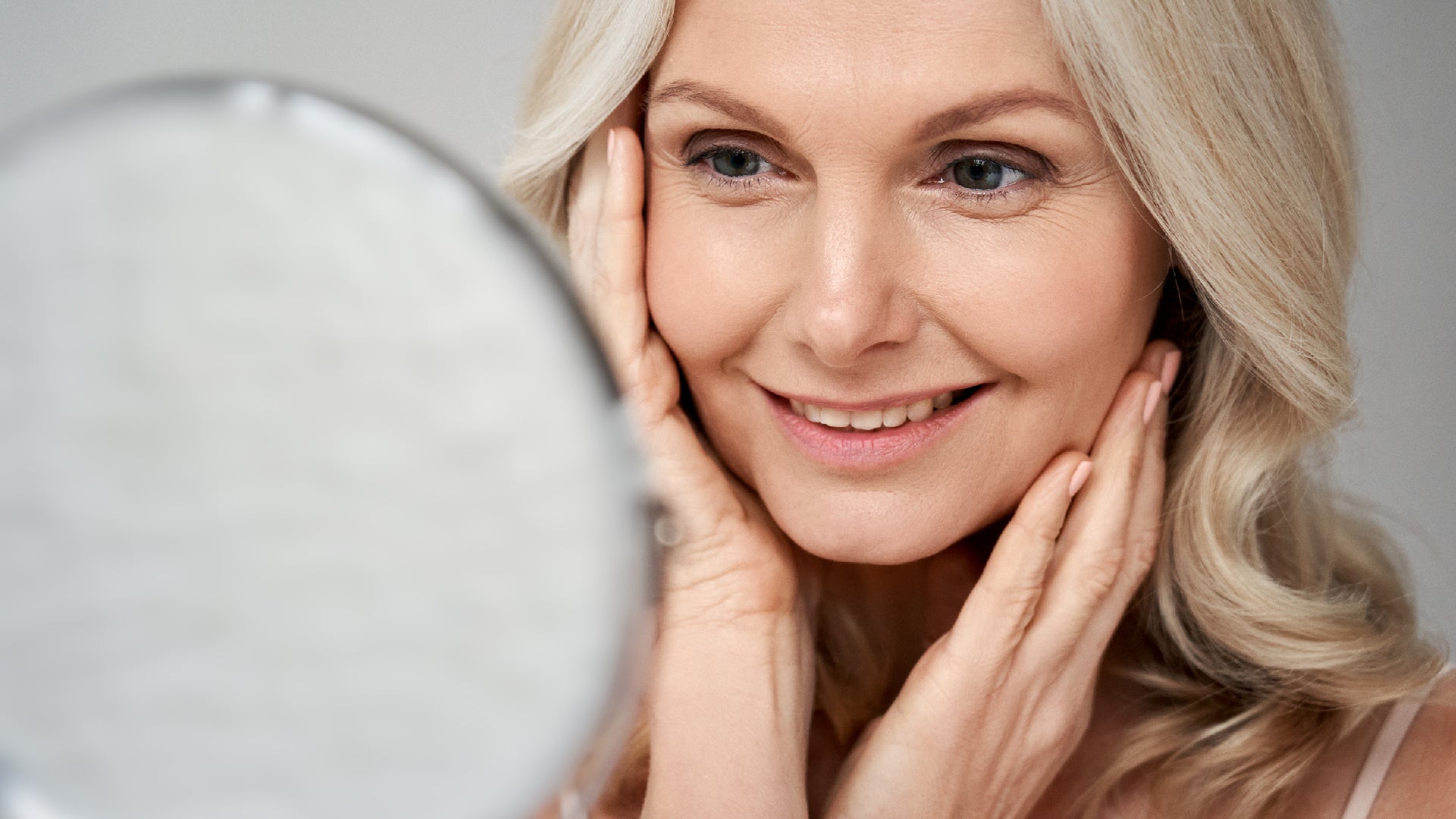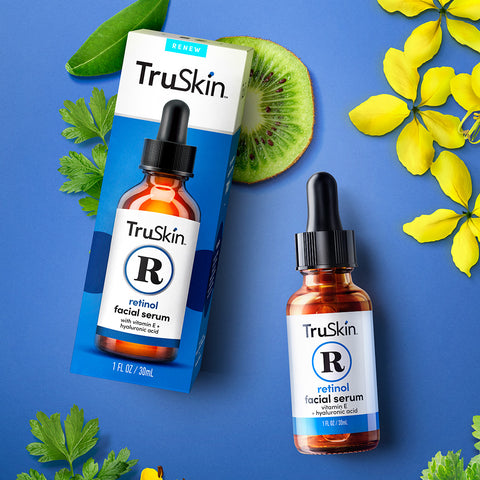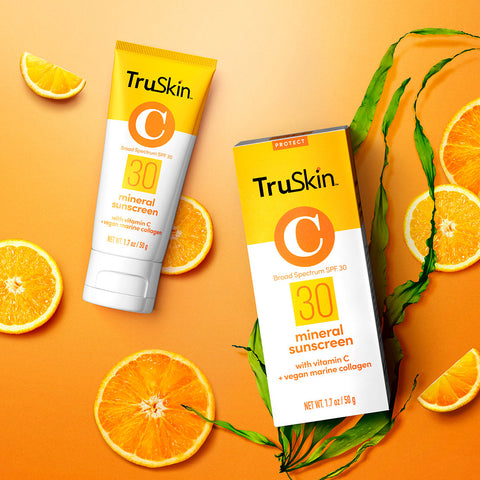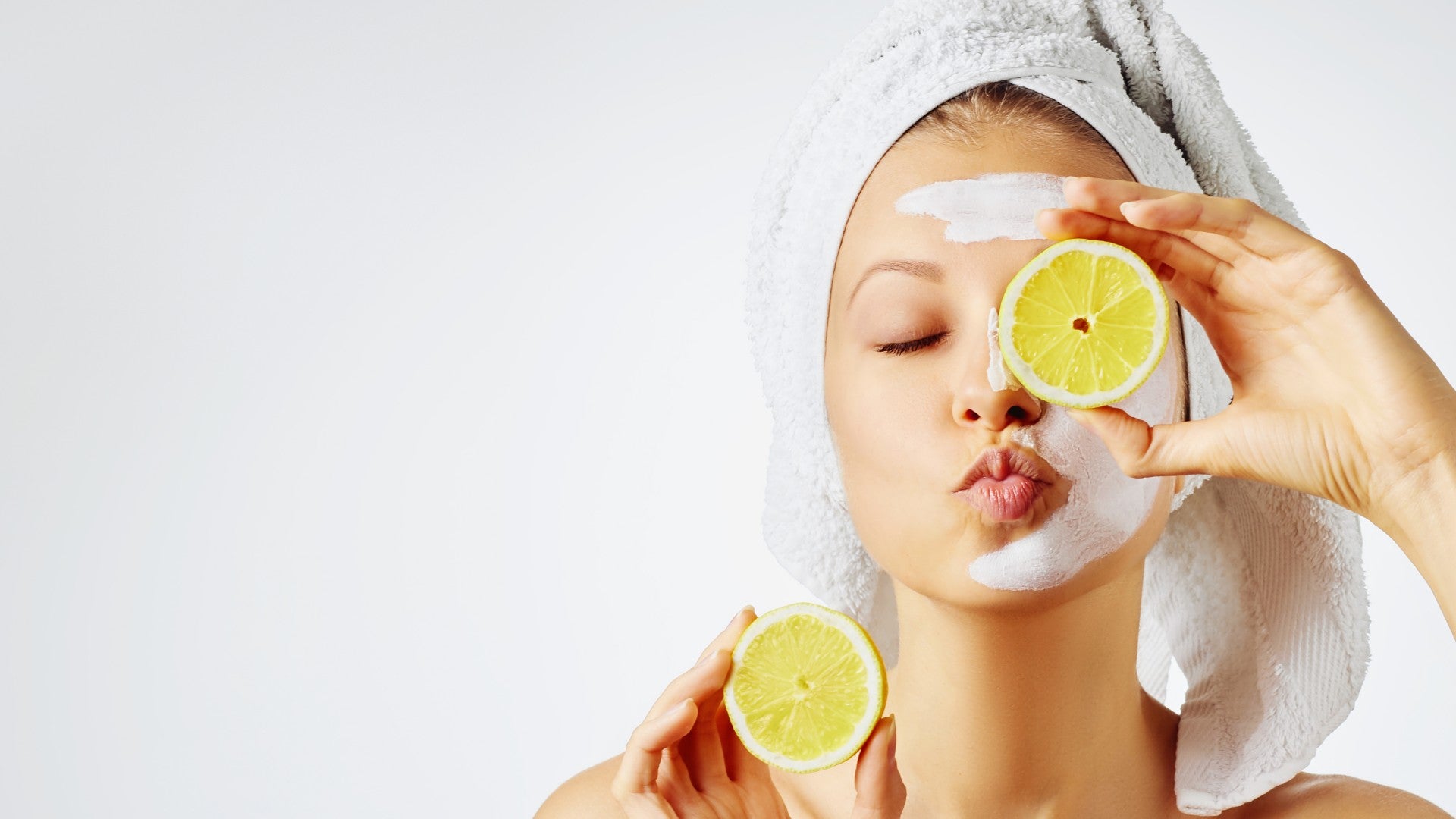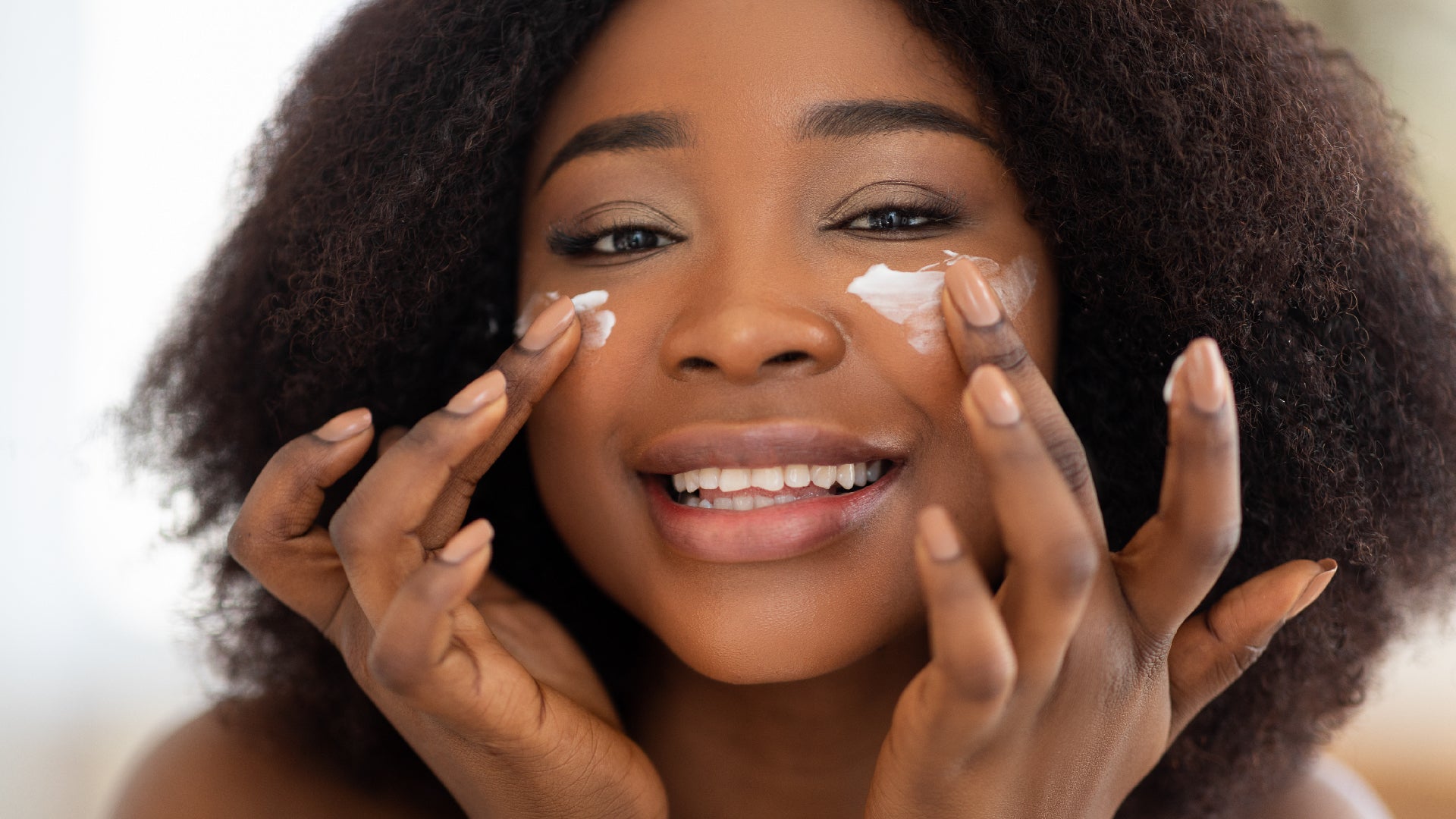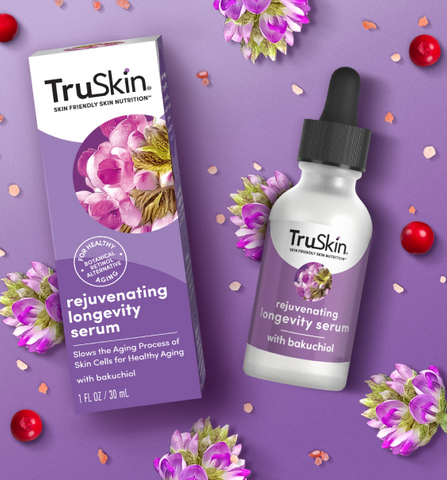
True Radical Honesty From Our Community
What To Do If You Hate Those Fine Lines Around Your Lips
Read MoreAdvice for all of your skin care needs
-
Are eye creams an important part of an effective skincare routine? Or are they just fancy moisturizers in smaller packages? Read on for everything we know about the skin around your eyes and why an eye cream can actually be a very smart choice.
Skincare companies like ours exist because we want to help you make the most of your skin. We’re not here to pull the wool over your eyes or force you to spend your $$$s on pointless lotions and potions that you don’t actually need. That’s why we think about every single product before launching, ensuring we produce only the very best formulations for your skin, with the highest quality ingredients and years of skincare intel.
This leads us neatly to a slightly contentious skincare topic: eye cream. Cynics might believe these are just industry hype, but they’re so much more than luxurious items that do very little. In fact, an eye cream can really take your skincare routine to the next level – especially if you have specific concerns about the skin around your eyes.
Of course, if you’re young and haven’t yet had the pleasure of welcoming things like dark circles, crow’s feet, puffiness and sagging skin to the eye party, you’re probably OK living without an eye cream. For now, anyway. However, if you’re long past those glory days of youth, this small but unassuming skincare great can be a powerful weapon against the visible signs of aging around the eyes.
What’s The Deal With The Skin Around Your Eyes?
Skin is skin, right? Wrong. Sure, the general structure of your skin is similar all over your body, but it’s not the same.
The skin around your eyes, for example, is way thinner than the rest of your face. This means its barrier function is similarly thin and collagen is less readily available. This small area of your face also contains very few sebaceous glands which, as you know, are important for producing sebum and helping to keep the skin soft, supple and moisturized. Couple all this with the fact the skin around your eyes also lacks muscle and fatty tissue and it’s no wonder that it ages up much quicker than the rest of your face. It can be drier and more sensitive. Underlying veins and vessels can also be more visible, and the skin under your eyes, in particular, is prone to becoming loose and lax lightning fast.
So there you go. The skin around your eyes is very different from the rest of your face. And it consequently has quite different skincare needs.
Is This Why Eye Cream Is Important?
In a word, yes. Eye creams are quite different to regular face creams because they’re built to tackle a different kind of skin with a whole bunch of unique issues. For starters, sure, most eye treatments contain those all-important moisturizing ingredients but, in general, eye formulations are way gentler than classic face moisturizers which can easily overload the skin around your eyes.
Another way eye creams and face creams differ? Their level of potent, active ingredients. Things like retinol and exfoliating acids, for example, are a great way to tackle the signs of aging on your face and neck, but the concentrations used for your face can often be too powerful and irritating for your eyes. It’s also wise to avoid strong alcohols, synthetic fragrances and harsh preservative around your eyes. But, tbh, we also like to avoid them on our entire faces and bodies. Just saying!
Then there’s all the stuff that eye creams do contain – intentionally put there to deal with eye-specific concerns like dark circles, puffiness, sagging, volume loss and fine lines. You’ll often find ingredients like caffeine, licorice and kojic acid in eye products which work hard to treat under-eye bags. But do you really need those in your regular face cream? Probably not.
And that’s the honest truth about eye creams. Sure, a gentle face cream is fine if you simply want to keep the skin around your eyes moisturized. But if you want to target deeper issues than pure moisture, then a treatment tailored for this specific area is priceless.
3 Of The Best Eye Creams To Try Now
With all that in mind, we couldn’t leave without a nod to our awesome line-up of eye-loving skin treatments…
1. Depuffing Longevity Eye Cream
Part of our new Longevity range which launched last year this healthy aging eye cream is already proving to be a huge hit. The secret to its success comes from bakuchiol, an ingredient that’s still fairly new to skincare but has been quite rightly deemed nature’s answer to retinol. And that, dear friends, is no mean feat.
Studies show that bakuchiol offers all of the skin-regenerating benefits of retinol – improving cellular turnover and accelerating collagen synthesis – but is way kinder to your skin, making it absolutely perfect for the delicate skin around your eyes. This lightweight eye cream combines bakuchiol with coffeeberry extract and lingonberry stem cells to not only strengthen the skin but to help improve the appearance of dark circles and puffy eye bags at the same time. We call this one of our ‘must-try’ products.
Say hello to our creamiest, dreamiest and most hydrating eye treatment that steadily and effectively promotes firmer, brighter skin around your eyes without overloading it with heavy ingredients. Because that is so not want you want in an eye cream.
Hyaluronic acid is the name of the game here, which visibly plumps the skin by drawing moisture to the surface and bidding farewell to unwanted dehydration. But that’s not all this weightless treatment has to offer. Oh no. It also contains vitamins E and B5 to offer antioxidant protection while soothing, nurturing and empowering your barrier function to keep up the hard work of keeping moisture in, and the bad guys out. Add in a little glycolic acid and vitamin C for their awesome brightening powers and you’ve got yourself a pretty fabulous all-round powerhouse for tired eyes.
Powered by peptides and with a feather-light gel formulation, this daily treatment is your go-to for tackling fine lines, battling eye bags, sorting out dark circles and basically dealing with pretty much any eye concern you throw at it.
Peptides are known for helping to support collagen and elastin so we harnessed this knowledge and teamed a special peptide complex with plant stem cells, licorice extract (a whizz for reducing puffiness) and hyaluronic acid to offer the skin around your eyes everything it deserves in an eye treatment. We’re talking antioxidant protection, awesome hydration, anti-inflammatory care and gentle, plant-powered potency. Skin aging, beware, this eye gel is truly a force to be reckoned with.
Let’s Be Honest, Are Eye Creams Really Necessary?
read more -
When it comes to looking after mature skin, moisturizer is great. Heck, it’s vital. However, if you really want to amp up your skincare routine, choosing the right facial serum is everything.
Serums can be tricky to get your head around. Some believe they’re nothing more than an ‘extra’ step in your routine – one that’s, frankly, not that important – while others happily include them in their routine, but then think they can do without moisturizer.
Wrong. And wrong.
Facial serums are, in fact, a vital addition to your skincare routine if you want to target specific issues and concerns that go above and beyond what ‘regular’ basics like cleanser and moisturizer can offer. You see, unlike moisturizers they have a very small molecular structure which allows them to penetrate your skin to channel active ingredients like retinol, vitamin C and peptides deeper below the surface – which is often where they’re needed the most.
Moisturizers, as great as they are, don’t do that. They are, however, essential for sealing in moisture which serums can’t do. And that’s why they make the perfect skincare team.
Navigating the serum world doesn’t come without its challenges, though. With literally thousands to choose from, how exactly do you make the right decision for your skin? What’s best for dealing with dark spots? Which ingredients should you look out for if you have particularly sensitive skin? And is there something out there that can tackle aging AND oily skin?
Below, we talk you through our top ten facial serums so you can make an informed decision on what’s right for you…
The Sensitive Skin Wrinkle Reducer: Rejuvenating Longevity Serum
As you probably know, retinol is ‘it’ for targeting wrinkles, dull skin and basically making your skin look ten times better. And nobody puts retinol in the corner, us included. But as incredibly effective as retinol is, it also has its downsides. Namely being the frequent cause of dryness, irritation and redness to sensitive skin types. Well this is where bakuchiol shines. Frequently touted as ‘nature’s answer to retinol,’ bakuchiol offers all the benefits of this anti-aging wonder ingredient, but with fewer (if any!) side effect. Our Rejuvenating Longevity Serum harnesses all this, alongside revitalizing snow algae and lingonberry stem cells to offer sensitive skin the healthy aging serum it deserves.
The Early Aging Treatment: Smoothing Collagen Serum
Collagen is one of the most important components in your skin, keeping it strong, supple and firm. But life’s a b*tch and once you hit your mid-20s your collagen levels start to dwindle by about 1 percent every year. That might not sound like a lot but you’ll sure notice it in ten years when your skin, well, just isn’t what it used to be. If this sounds familiar and you’re already seeing fine lines around your eyes and a little sagging around the jawline, our Smoothing Collagen Serum could be just what you need. It combines collagen peptides (vegan, of course), ceramides and a powerful blend of antioxidant-rich superfruits to kick-start collagen synthesis and help prevent your skin aging up before its time.
The Skin Brightening Superhero: Vitamin C Facial Serum
The OG of TruSkin and still a fan favorite, our Vitamin C Facial Serum is hard to beat if you’re looking for an insanely good facial serum to not only help glow up your skin but to protect it from the onslaught of environmental aggressors (sun, yes, we’re talking about you).
Like retinol, pure vitamin C can be a tad irritating if you’re not careful, but we cut out all of those risks by using a C-derivate called sodium ascorbyl phosphate (SAP). SAP is a salt form of vitamin C which makes it kinder to the skin and one of the most stable versions available in skincare. It’s a shoo-in for dull, aging skin.
The All-Round Nice Guy: Multi-Vitamin Facial Serum
While some people love to really hone in on the things they don’t love about their skin, others prefer a more rounded approach to skincare. And that’s why we created our Multi-Vitamin Facial Serum. Like an oral muti-vit supplement, but one you apply topically, this lightweight milky facial serum comes brimming with no less than 11 plant-derived vitamins, minerals and electrolytes to offer an all-in-one approach to youthful, healthier-looking skin. It helps improve tone, texture, firmness and hydration without having to rely on 10 other products to do the exact same job. Smart stuff.
The Mature-But-Still-Oily Skin Savior: Tea Tree Super Serum+
We don’t know about you but we specifically remember being told that our greasy, teenage skin a) would not be so oily as we got older and b) would age way better than our friends with drier skin. Lies, all lies. OK, so the oil might have a subsided a little and the wrinkles aren’t so bad, but still miracles definitely did not happen.
Oily, mature skin is not easy to manage. In fact, the words ‘balancing' and 'act’ come to mind. Which is why you should make tea tree oil your BFF. Due to its potent anti-inflammatory and antimicrobial properties, tea tree oil is fantastic for treating super-oily skin, enlarged pores and breakouts. Our Tea Tree Super Serum+ blends it with hyaluronic acid to deal with dehydration, plus niacinamide and organic aloe. Gorgeous.
The Dehydration Rescue Serum: Hyaluronic Acid Facial Serum
Unless you’ve been hiding under a very large rock for the past ten years, hyaluronic acid will be no stranger to you. To refresh, hyaluronic acid, sometimes known as hyaluronan, is a sugar molecule that’s found by the bucketload in your skin where it helps keep it cushioned, lubricated and hydrated by drawing in water like a sponge. Dehydration can be a major issue as you get older because your natural levels of HA disappear and your barrier function becomes weaker.
If dehydration is something you’re concerned with, you can’t go wrong with Hyaluronic Acid Facial Serum. As the name suggests, it comes packed with oceans of hyaluronic acid alongside vitamins C and E.
The Dark Spot Destroyer: Vitamin C Super Serum+
Wrinkles are one thing but they’re not the only skin gripe we have to deal with as we get older. Dark spots, aka hyperpigmentation, are also a thing and they’re caused by an overproduction of melanin which happens as a result of too much sun, acting-out hormones or some kind of skin trauma like acne or a burn.
Sounds familiar, then add Vitamin C Super Serum+ to cart right this minute! Why? Because vitamin C was born to help fade existing dark spots and prevent new ones from forming. This highly powered serum also blends retinol for extra anti-aging prowess, plus niacinamide to soothe and hyaluronic acid to hydrate. Word is, it’s so good, you probably only need to apply it a few times a week.
The Overnight Rescue Remedy: Retinol Facial Serum
What kind of skincare company would we be if we didn’t have a retinol serum? Thankfully, we’re not those people. Say hello to Retinol Facial Serum which combines this anti-aging heavy-hitter with hyaluronic acid, vitamin E, glycerin and aloe to help counteract and balance the strength of retinol. Contrary to popular belief, retinol is perfectly fine to apply morning and night but we prefer to save it for bedtime. How so? Well, retinol is ideal for helping your skin to regenerate as you sleep plus saving it for nighttime means you get to use a completely different serum in the morning, ha!
The Skin Harmonizer: Niacinamide (B3) Facial Serum
Another one of our winning all-rounders, Niacinamide (B3) Facial Serum is the absolute nuts for treating a whole bunch of skin types and concerns. Along with vitamins C and E, niacinamide is an effective antioxidant that works hard to help your skin neutralize damaging free radicals. It’s also fantastic at balancing sebum, calming inflammation and increasing the production of ceramides in the uppermost layers to help maintain a strong, protective barrier and more resilient skin.
The Skin Firming Friend: Peptide Facial Serum
Peptides are often talked about in skincare but they can be hard to get your head around. All you really need to know is that, like proteins, they’re chemical compounds made up of amino acids. Because of their similarity to proteins, studies show that peptides are able to penetrate the skin really well, signaling your cells to produce more collagen – undoubtedly the skin’s most important protein of all.
Proteins are key if you want to maintain firmer, smoother and more lifted skin, so it figures that anything you can do to boost collagen, elastin and keratin (all proteins in their own right) is a major plus for the look and feel of your skin. Peptide Facial Serum is just the job here, not only targeting your skin’s essential proteins but also helping to strengthen, hydrate and tone your complexion.
The 10 Best Facial Serums For All Types Of Mature Skin
read more -
PSA: pair vitamin C with other effective skincare ingredients and it becomes next-level good.
Vitamin C is basically our middle name here at TruSkin. Don’t get us wrong, we love any skincare ingredient that offers real-life benefits to your skin that you can actually see and feel. Retinol is one of the first that comes to mind, but also bakuchiol, its plant-derived cousin has also become a permanent fixture in our daily routines.
However, there’s something about vitamin C that makes it hard to beat. Vitamin C is a powerful antioxidant that’s been proven to fight environmental stressors and thus protect your skin from all the damage that comes from exposure to things like smoking, pollution and, quelle surprise, UV radiation. It’s also known to inhibit a certain enzyme in your skin called tyrosinase which helps keeps melanin under control and reduces your likelihood of developing sun-related dark spots and an uneven skin tone. And if you’re worried about the potency of pure vitamin C on your skin? Don’t be. L-ascorbic acid (the pure stuff) packs a pretty mean punch, for sure, but there are many kinder-to-skin derivatives out there, including our favorite, sodium ascorbyl phosphate which is gentle, but oh-so-mighty.
All this is great, but one of our absolute favorite things about vitamin C is that it partners so well with other true greats. So which ones are worth your time? We’ve rounded up the vitamin C pairings we believe are pretty unbeatable.
Vitamin C + Vitamin E: The Ultimate Antioxidant Duo
As skincare couples go, vitamin C and vitamin E are an unbeatable little double act. You know that phrase, ‘you complete me’? That's these two, in a nutshell.
C and E are both potent antioxidants and proven to neutralize damaging free radicals which form in the skin when it’s exposed to environmental nasties. This helps reduce oxidative stress, slowing down cell damage and thus helping to preserve important proteins in your skin like collagen and elastin. As you know, these are super important to keep your skin strong, soft, clear and youthful-looking.
Of course, vitamin C does a pretty good job of this on its own, but if you combine it with vitamin E you automatically amp up both of their superpowers with zero effort at all. You see, vitamin E strengthens and accelerates vitamin C's protective abilities by preserving its stability and efficacy. Meanwhile, C stops E’s age-fighting powers from depleting as it fights off those free radical bad guys.
Vitamin E is also great at soothing and hydrating the skin as an extra bonus. Together, they're the ultimate fighting champions.
Vitamin C + Sunscreen: Great Alone… Even Better Together
As we’ve drummed into you by now, sunscreen is the number one way to fight off external skin aging, reducing your likelihood of developing everything from lines and wrinkles through to dull skin, sagging and dark spots. Any broad-spectrum sunscreen that has a decent SPF of at least 30 is going to effectively shield your skin from sun damage. No arguments there. However, there’s one way to make your sunscreen work even better. And that’s by pairing it up with vitamin C.
Studies show that vitamin C makes sunscreen work harder by neutralizing more free radicals than sunscreen is able to do on its own. It’s also thought to help your sunscreen absorb more UV radiation.
The truth is that sunscreen is only able to shield your skin from around 50 percent of the number of free radicals caused by the sun. And not only that, but even the most highly protective sunscreens that boast SPFs of staggering numbers can only protect your skin from around 98 percent of UV radiation. This means a certain number of UV rays are always going to sneak through. Ditto free radicals.
C to the rescue. And how!
Try: SPF 30 Sunscreen with Vitamin C
Vitamin C + Hyaluronic Acid: The Hydrating Power Couple
Vitamin C plays pretty well with most skin types – especially if you stick with the skin-loving sodium ascorbyl phosphate – but still, everyone’s skin has different levels of sensitivities so irritation can never be counted out.
So, what’s a great way to reduce your chances of flaring up? By ensuring your skin’s barrier function is strong and well hydrated. Of course, gentle cleansing and moisturizing is key, but another effective trick for rehydrating your skin is to couple your vitamin C with the master of moisture: hyaluronic acid.
Hyaluronic acid (HA) is a type of polymer that acts as a powerful lubricant and humectant. More technical jargon, we know, but humectants are water-loving components that suck in moisture and hold onto it like a sponge. They’re essential for keeping the skin hydrated, plump and smooth and, as humectants go, HA is kind of a big deal. Just one gram of the stuff can hold up to six liters of water.
HA is very gentle on the skin and works like a dream with most other skincare ingredients, especially vitamin C whose anti-aging and texture-enhancing abilities get enhanced like nobody’s business by the powers of HA. HA can also counteract any sensitivities or dryness you might experience from vitamin C. Major plus points.
Vitamin C + MSM: The Collagen Protectors
It upsets us that MSM isn’t center stage like vitamin C and retinol, but hey, not everyone can be the leading lady, right? But don’t let that fool you because, just like any great movie, the supporting actors are just as important. Often even more so. And MSM is all that… and then some.
Not familiar with the powers of MSM? Well, to quote its full name, methylsulfonylmethane is a natural-occurring form of sulfur that’s often referred to as the ‘beauty’ or ‘healing’ mineral. Does it deserve such a nickname? Absolutely. Its inherent ability to encourage blood flow, fight inflammation and boost collagen makes it a total whizz-kid for the skin. Simple as. It also works darn hard to fight environmental damage by helping to enforce your body’s natural defense system, so there’s also that.
In skincare, vitamin C helps your skin to readily absorb MSM, doubling up their combined collagen love and working extra hard to fight off the visible signs of premature aging.
Try: Vitamin C Deep Hydration Night Cream
Insanely Good Skincare Ingredients That Pair Well With Vitamin C
read more -
Are social media skincare hacks harmful or helpful? To follow, our thoughts on five of the latest beauty fads doing the rounds…
Isn’t social media awesome? Well, it is, until it isn’t. You see, the problem with giving everyone a voice and a platform on which to share their skincare routines and DIY beauty hacks is that not ‘everyone’ is an expert. In fact, most people are far from it. Of course, there are plenty of fabulous makeup artists, dermatologists, plastic surgeons and aestheticians you can follow across Instagram, YouTube and TikTok and a lot of them have incredible advice to offer. There’s also a lot to be said for things like Facebook Groups where, if you struggle with chronic skin issues, you can connect, learn and find solace from others with similar concerns.
But then there’s all the other 'stuff' from people who have so much to say… about things they don’t know that much about. And this is the kind of information that can do more harm than good. This is why we’ve sifted through some of the most recent viral skincare fads you might want to be wary of. Instead, read on for the real truth about how best to take care of your skin.
1. Slugging
What Is Slugging?
Skin slugging might sound gross, but it’s become a huge deal on TikTok, with its hashtag currently notching up around 1.5 billion views.
Not to be confused with most people’s least favorite mollusk, slugging involves smearing a thick layer of petroleum jelly all over your skin as the last step in your nightly skincare routine. Do so and you’re guaranteed to wake up with the softest, most moisturized skin ever. So they reckon, anyway.
Is Slugging Good For Your Skin?
This trend started gaining momentum almost two years ago, but it will not go away. Therefore there has to be something in it, right? Well, petroleum jelly is an occlusive ingredient that creates a seal over your skin to help lock in moisture. So, sure, it will definitely stop water from evaporating from the surface of your skin as you sleep, we’ll give you that. However, petroleum jelly has no hydrating qualities. At all. This means it doesn’t really moisturize your skin, it just stops any moisture that’s already present from escaping from the surface of your skin.
Not only that but petroleum jelly creates a barrier over your pores, completely blocking them and causing no end of problems for oily skin types. Namely, breakouts like you will never believe.
Much Better Advice?
Rather than slathering your skin with what is essentially just ‘grease,’ you’re much better off applying night cream to not only lock in moisture but to help hydrate and feed your complexion with skin-loving ingredients like antioxidants, ceramides, peptides and/or vitamins and minerals.
Our Vitamin C Deep Hydration Night Cream is a great bet or why not try the combo of our new Rejuvenating Longevity Serum and Renewing Longevity Moisturizing Cream?

2. Potatoes For PimplesWhat's It All About?
Dealing with acne can be a real struggle. Especially when you reach adulthood when you were promised your skin would be so much clearer. But it’s not common to be plagued by breakouts as you get older. In fact, research shows that around 25 percent of American women in their 40s suffer from some kind of acne.
It’s no wonder, therefore, that there are so many short-term hacks for dealing with pimples. Back in the day it was toothpaste and nail varnish remover (gasp!). Now it’s slices of raw potatoes. The idea is that you tape a small slice over your spot to make it magically disappear. Some TikTokers have even resorted to rubbing the whole darn thing over their skin.
Are Potatoes Good For Your Skin?
Don’t get us wrong, we love a potato as much as the next person. But on our dinner plates, not taped to our faces. So, why has this acne hack become such a thing? Ha, your guess is as good as ours but the main draw is that potatoes have anti-inflammatory and antioxidant properties which are both known to help reduce redness and unwanted pigmentation.
They also contain exfoliating and oil-reducing properties and feel nice and cool on the skin which is a big deal when you have a big, throbbing red zit on your chin. So maybe, just maybe, they might offer some short-term benefits. But little more than that.
Much Better Advice?
If you’re an acne sufferer, you’ll understand that short-term fixes are all well and good but, in truth, it’s all about the long-term. This is why we prefer to treat and control breakouts with smart skincare that’s been specifically (and safely!) formulated for the job. Products that contain science-led and dermatologically-tested ingredients like salicylic acid, tea tree oil and AHAs are going to offer your skin way better benefits than a bag of your best russets. Sorry, but they just will.

3. Sunscreen Contouring
What Is Sunscreen Contouring?
If we had to choose just one viral beauty trend that gets our blood boiling the most, it would be sunscreen contouring. Stupid at best, downright dangerous at worst, sunscreen contouring is when you apply sunscreen to select areas of your face and body only, in order to intentionally create tan lines for a contoured effect.
Some people have taken to applying a lower SPF to areas of their face they want to tan more, and a higher SPF to those they want to remain pale and ‘highlighted’ but either way, this is bad news.
Is Sunscreen Contouring Good For Your Skin?
Absolutely not. Not even slightly. The sun is responsible for almost 90 percent of skin aging, accelerating the formation of fine lines, wrinkles, sagging and dark spots. This means it’s absolutely essential to protect ALL exposed skin to the damaging effects of UV radiation. Because tan skin = damaged skin. End of story. Not only that, but c’mon people, skin cancer.
Much Better Advice?
First, in order to truly protect your skin from the damaging effects of the sun, you need to apply SPF 30 Mineral Sunscreen every day to all areas of exposed skin. The alternatives are just not worth it. And if you do want to create contours on your face and body such as highlighting your cheekbones, sculpting your nose or defining your abs, stick with a self-tanning lotion or makeup. Easy. And way less damaging.
4. Lemon Juice As Toner
What's It All About?
Pure lemon juice. As toner. Simple as that.
Yes, lemons are astringent, yes they’re packed with vitamin C and yes, vitamin C is awesome for the look, feel and health of your skin. But when life gives you lemons, do not squeeze out their juice and use it to tone or brighten your face.
Is Lemon Juice Good For Your Skin?
Citric acid can be an incredible ingredient in many topical skincare treatments, offering great antioxidant qualities and helping to fight environmental skin damage. However, skincare products are formulated in certain ways and use very specific concentrations of ingredients in order to help benefit your skin without causing irritation. Pure lemon juice, however? The opposite. Applying it in its pure form can seriously irritate your skin, screwing up your barrier function and causing long-term issues with hyperpigmentation and sensitivities. It can even burn your skin if you’re not careful.
Keep yours for the G&Ts and leave lemon skincare cocktailing to the pros, OK?
Much Better Advice?
Get your fix of vitamin C from a facial serum that contains sodium ascorbyl phosphate (SAP) which is a gentle and very effective form. Our Vitamin C Facial Serum is always a big favorite but we also have the mighty Vitamin C Super Serum + which really amps up your glow factor. We like to use it twice a week, alternating between this and the OG.
5. Face Taping
What Is Face Taping?
This cheeky little trick has been used by Hollywood’s finest for decades so sorry, TikTok-ers, but you did not invent this one. Also known as wrinkle taping, the idea behind it is that you strategically place sticky tape on your face, usually overnight, to lift the skin, reduce muscle movement and therefore reduce the appearance of fine lines and wrinkles. It’s most often used under the eyes, at the edges of the cheeks, over the forehead or across the chest area.
You can also use face tape to provide an immediately lifting effect, keeping it on for an event, for example, whilst camouflaging it with heavy makeup.
Is Face Taping Good For Your Skin?
As an immediate wrinkle-reducer and skin-smoother, face taping is actually pretty effective. But it’s a very short-term fix and takes a lot of clever makeup artistry to cover the tape and make it look natural.
As an overnight solution however? Yeah, we’re not convinced. For one thing, the glue that’s used on the tape can be super irritating for some skin types, especially if it’s used under the eyes where your skin is thin and extremely delicate. And for another, leaving the tape on for long periods of time can clog your pores and encourage breakouts. The phrase, ‘out of the frying pan, into the fire,’ comes to mind.
Much Better Advice?
Two words: effective skincare. Cleansing and exfoliating regularly, treating your skin with daily antioxidants, applying sunscreen daily and using age-defying ingredients like retinol, bakuchiol, hyaluronic acid and vitamin C? So much better than silly old face tape that might be OK for ten minutes but will do no good in the long-term.
Try our new Smoothing Collagen Serum, Firming Collagen Day Lotion and Collagen Boosting Skin Supplement which are great for healthily preventing premature aging.
Good Or Bad? 5 TikTok Skincare Trends – Dissected
read more -
As skincare ingredients go, vitamin C is seen as the holy grail of glowy, radiant skin. But does vitamin C really work? And if so, how?
Vitamin C. If you know anything about TruSkin, you will know that we are all about it. Our first ever product was our award-winning and best-selling Vitamin C Facial Serum and over the last ten years, almost our entire range has been built around this fan favorite face treatment.
But what exactly is it about vitamin C that makes it SO good that it had to be the absolute foundation of our skincare journey? And why is it hailed as the one of the best ingredients for brightening dull skin?
Read on for the three main reasons we believe vitamin C deserves every inch of its glow-getting praise…
Vitamin C: The Antioxidant Master
Vitamin C is a very powerful antioxidant. Science says so. And who are we to argue with science?
Antioxidants are super important for the health of your skin. You see, life can be a constant struggle as far as your skin is concerned. You can’t get away from sun exposure, environmental pollution and stress – they’re all part of daily life. But they’re no good for your skin. Similarly, a lack of sleep, poor diet choices and smoking all contribute to this onslaught of aggressors that totally compromise the strength and stability of your skin.
Why are these such bad news? Two words: free radicals. Free radicals form in your skin when it’s been exposed to the aforementioned daily aggressors. They’re very unstable, highly reactive atoms that have unpaired electrons, and their mission in life is to pair up these electrons in order to stabilize themselves. In order to do that they commit theft, pinching electrons from unsuspecting healthy cells and proteins in your body. In your skin, specifically, they seriously chip away at things like collagen and elastin, damaging your skin’s tone and texture, and making it look dull and sad at lightning speeds.
Thankfully, the world has blessed us with antioxidants which help neutralize free rads by offering up electrons without themselves becoming damaged. They’re super important in the quest for healthy, bright skin which is why applying a topical antioxidant every day should be a vital part of your skincare regime.
We have tons of awesome vitamin C products for you to try but if you really want to reap the benefits, you should opt for a facial serum first and foremost. Serums have a very low molecular weight which means they’re able to penetrate your skin and deliver all their goodness exactly where it’s needed. Try our high-powered Vitamin C Super Serum + which offers a concentrated hit of vitamin C alongside hydrating hyaluronic acid and soothing niacinamide.
Vitamin C: The Dark Spot Warrior
Granted, most people know about vitamin C’s extraordinary antioxidant powers, but that’s not all it offers in terms of skin-brightening assistance.
Studies have also shown that vitamin C helps reduce dark spots and an uneven skin tone by blocking melanin production. As we’re sure you know, melanin is what gives your skin (as well as your eyes and hair) its color. The more melanin your skin produces, the darker your skin naturally is.
Melanin also absorbs UV radiation to help protect your skin from sun damage. This is why, when your skin is exposed to sunlight, melanin production amps up and your skin may become darker. Sometimes this is uniform and you tan, but other times melanin production becomes a bit wayward, and your skin tone becomes patchy and irregular as dark spots appear.
Dark spots can really kill your skin’s radiance, giving your tone an uneven appearance and generally making it look like kind of ‘meh.’ Of course, sunscreen is vital for warding off sun damage, but vitamin C is another great way to help keep melanin under control.
How does vitamin C help reduce the appearance of dark spots? Well, research shows that it inhibits a certain enzyme called tyrosinase which melanin needs in order to synthesize. Without tyrosinase, melanin production slows down meaning less darkness and potential patchiness as a result. Bingo!
Try the awesome duo of Vitamin C Brightening Cleanser each morning, followed by Vitamin C Facial Serum, Vitamin C Brightening Moisturizer and that all-important sunscreen. Winner.
We also have a Vitamin C Deep Hydration Night Cream to help brighten, strengthen and repair your skin while you’re asleep. Just remember to always patch test any of these formulations before using regularly all over. All of our products are gentle and suitable for most skin types but everyone’s skin reacts differently, so you can never be too careful.
Vitamin C: The Sunscreen Bestie
Going back to sunscreen for a minute, this is the number one way to fight off ALL signs of skin aging, including dull skin and dark spots. Any broad-spectrum sunscreen that’s mineral-forward and has an SPF of at least 30 is going to do your skin all number of radiance-boosting, protecting and anti-aging favors, that’s for sure. However, if you really want to soup up the effects of your sunscreen and double down on its benefits, vitamin C is a shoo-in.
Word is that vitamin C makes sunscreen work better and harder, neutralizing more free radicals (check!) and helping your sunscreen absorb more UV radiation (double check!).
The thing is, even the very best, most highly protective sunscreens can only protect your skin from 98 percent of UV rays, so there will always be a few that slip through the proverbial SPF net. Not only that but certain studies have shown that sunscreen is only able to shield your skin from around 50 percent of the number of free radicals caused by the sun. So why would you not want to try to catch all those extra rays and rads by combining the antioxidant prowess of vitamin C alongside your sunscreen? There’s no reason not to do that. No reason at all.
Especially when our SPF 30 Mineral Sunscreen has been powered up by vitamin C for you, anyway.
The pleasure is all ours!
Exactly How Does Vitamin C Help Brighten Your Skin?
read more -
Skin that’s unusually dry, itchy, dull or overly oily is trying to tell you something. And you need to listen.
Everyone’s skin can get a little sensitive now and again. Life just happens. Maybe you’ve overdone it with the retinol, perhaps your hormones are all over the place, or hold on, what about all those late nights you’ve been pulling recently? There are many factors, like these, that can upset your skin. And it’s your barrier function that first shows the signs of stress, furnishing you with all manner of skin peskies like dryness, itchiness, redness, inflammation, breakouts and dehydration.
Sounds familiar? Then read on for the best ways to improve your skin’s barrier function.
But First, What Is The Skin Barrier?
Your skin’s barrier is technically referred to as the stratum corneum. If you don’t care about fancy names, however, that’s fair enough, but know the following: your skin consists of three main layers. The deepest layer is the hypodermis which supplies blood and keeps your skin attached to your bones and muscle. On top of that you have the dermis which is where all the good stuff like hair follicles, sweat glands and blood vessels hang out. Then, right at the top is the epidermis which protects all the rest. The epidermis is pretty complex and consists of many intricate layers – the top of which is the stratum corneum, aka the skin’s barrier.
Your skin’s barrier is like a brick wall built from around 20 layers of cells. It provides your body with its first line of defense against things like pollution, allergens and other irritating environmental stressors. Being the outermost layer it’s vital for keeping these bad guys out, but it also works super hard to keep moisture in, helping to maintain soft, supple and healthy skin.
Truth is, your skin’s barrier is vital for the health of your entire skin. And it really gets put through the mill.
What Causes Damage To Your Skin’s Barrier?
So. Many. Things. Most of which you can probably guess, but here’s a list of the ten most common triggers of a compromised barrier function…
- Stress
- Over-exfoliation
- Natural aging
- A lack of sleep
- Harsh, chemical-laden skincare products
- Smoking
- Poor moisturizing
- UV radiation
- Environmental pollution
- Extreme temperatures
It’s also worth noting that everyone’s skin composition is different, so certain triggers that might break down your skin’s barrier might be totally fine for the next person. Pale skin, for example, naturally has a thinner and weaker barrier than darker skin types which means it’s more prone to irritation from common aggressors.
Your skin barrier also weakens as you age, so while your skin might have been totally unbreakable in your 20s, by the time you hit your 40s certain triggers can, out of the blue, start to have negative effects.
What Are The Signs That Your Skin Barrier Needs Help?
When your skin barrier is in good shape, your skin will look and feel just as awesome – glowing, healthy, moisturized and smooth. If it gets compromised, however, nothing good will come of it. We’re talking dryness, dehydration, itching, inflammation, redness, breakouts and more. Active products in your skincare regime might also produce stinging or burning effects that were never there before.
How To Repair The Skin Barrier
Once you’ve determined that your skin barrier is not feeling up to snuff, you need to think about the best ways to help strengthen and fortify it. And there are two important areas to take into account.
1. Your Skincare Routine
The most common and easiest way to damage and disrupt your skin’s barrier is through a complicated or over-zealous skincare routine. Harsh cleansing or exfoliating too hard and too often are massive no-nos as these can strip your skin’s barrier of the natural moisturizing factors that help to keep it healthy and in optimum working order. The same goes for applying too many active ingredients like retinol, glycolic acid and vitamin C on the reg. Basically, you just need to live by the classic rule that less is always more.
Stick to once or twice weekly exfoliation and only ever apply one facial serum at a time – no disrespect, but cocktailing active ingredients is best left to the professionals. Of course, you can still enjoy the benefits of different active ingredients but if your skin can’t hack it, don’t push it. Instead, try applying your serums on alternative days or just a couple of times a week. We love to use Retinol Facial Serum twice a week, and our Rejuvenating Longevity Serum every other evening. This, combined with Vitamin C Facial Serum in the mornings, makes for a pretty dynamite but caring combination.
Other important parts of your skincare regime to take into account? Well, do you like to shower, bathe and/or cleanse your face with super hot water? Bad idea. This strips your skin of essential moisture and lipids, totally compromising your delicate barrier function. Lukewarm water all the way, baby.
And to finish... two words: sunscreen and moisturizer. These are two of the most important products to have in your barrier-protecting skincare routine so never scrimp on either. Moisturize your skin every time you cleanse, using products that contain ingredients like ceramides, hyaluronic acid, squalane and niacinamide. These proactively help to strengthen and hydrate your barrier function. Then, always apply plenty of SPF 30 Mineral Sunscreen every morning without fail. But c’mon, you MUST know that by now…
2. Your Lifestyle Habits
Getting your skincare routine ship-shape is one thing, but you must also think about your entire lifestyle if you truly want to make a difference to the health of your skin’s all-important barrier.
Do you smoke? Maybe think about trying to stop that. Studies show that nicotine and other harmful chemicals found in cigarettes get absorbed into your skin, damaging blood vessels and changing the structure and function of certain cells which impairs healing and makes your skin age at lightning speeds. And vaping? Same thing.
Stress and a lack of sleep (which often go hand in hand) are other important ways in which your skin’s barrier can become negatively affected. Both throw your hormones out of whack and suck away important lipids and proteins in the skin, increasing transepidermal water loss (TEWL) and acclerating dehydration. Sure, it may be easier said than done to stress less and sleep more, but try to take time out for yourself each day by going for a walk or reading a book. And get thee to bed. Eight hours is the sweet spot but you should aim for at least seven.
Finally, you are what you eat so try to cut down on refined carbs, processed foods and sugar, and increase your intake of antioxidant-rich fruit and veggies, nuts, whole foods and oily fish. Oily fish, in particular, are incredible for the skin barrier because they’re high in omega-3 fatty acids which help decrease inflammation while improving your skin’s elasticity and moisturization.
Do all this and you barrier will start to look and feel better in no time, promise.
The Best Barrier Repair Tricks For Unhappy Skin
read more








